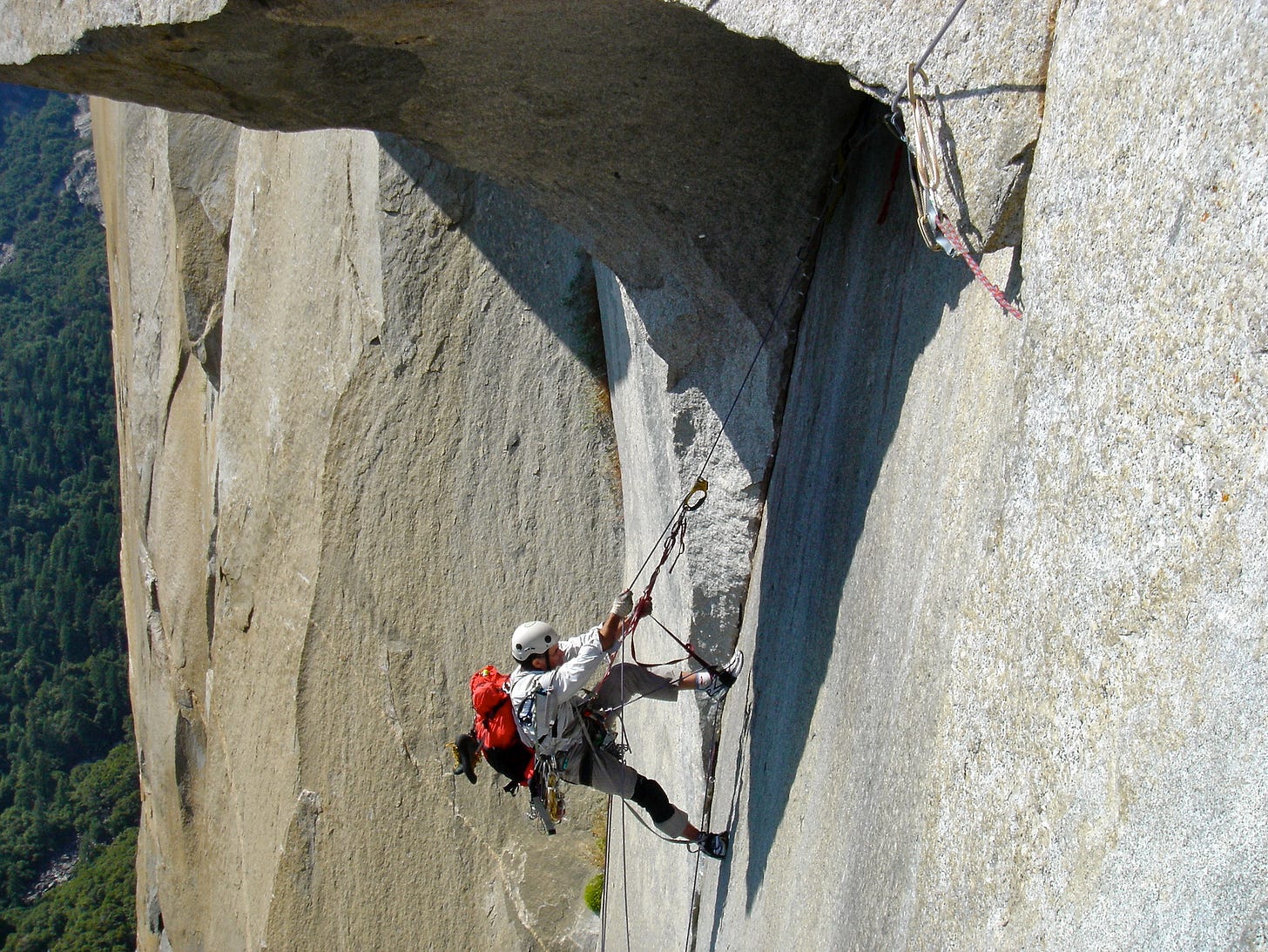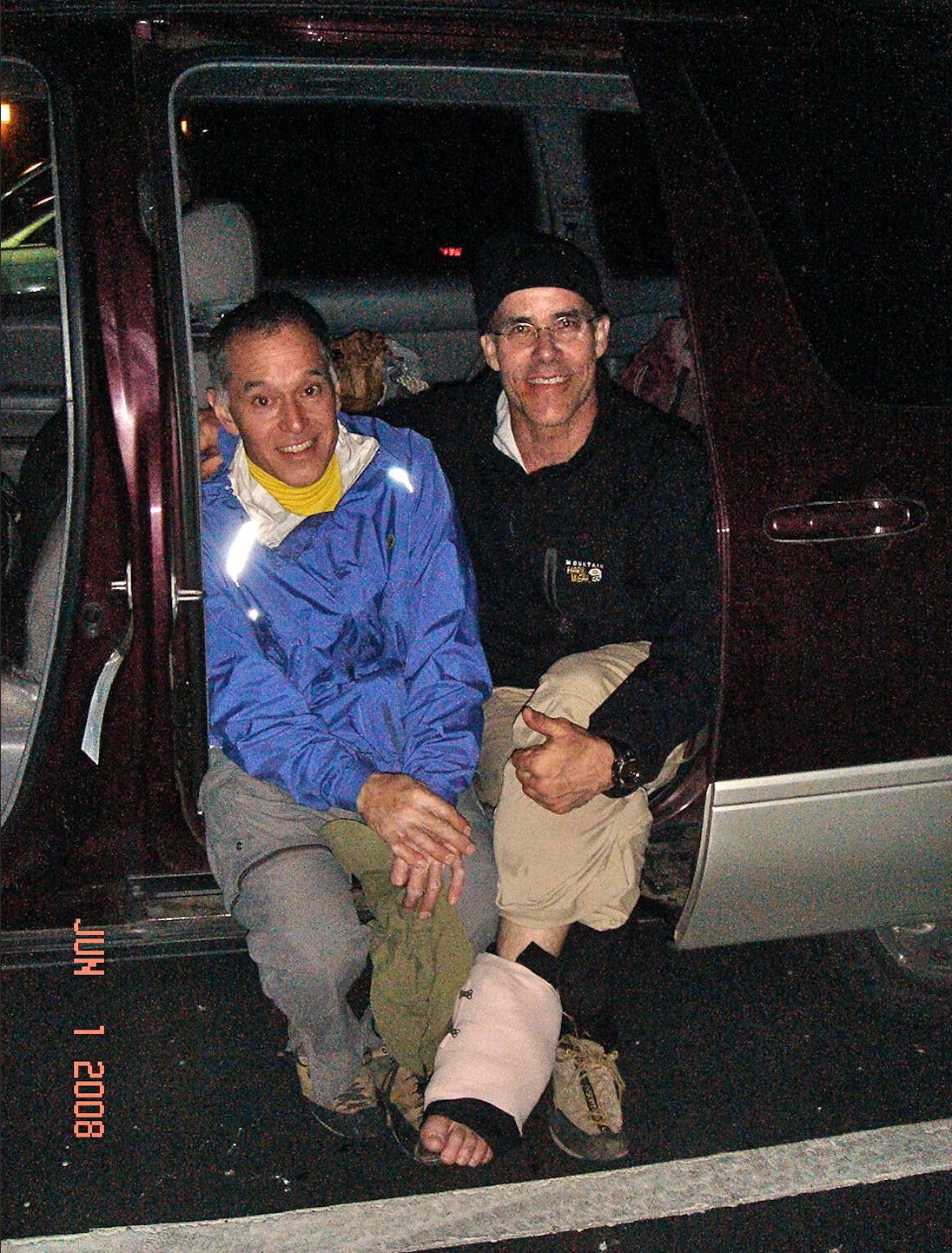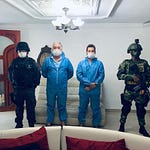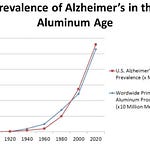If you search for my name, you will be treated to salacious accounts of my various lawsuits, medical board “accusations,” and other defamations. But trust me, there is more to the story. This is the same media telling you that the vax bioweapon is safe and effective. You also know by now that the new badge of credibility is being libeled. Judge me by my history.
I found high school effortless, and I attended Oberlin College. I then did medical training at major centers, including Dartmouth, USC, and Case Western. I had some idealistic mentors, but since I am unconventional, few bonded with me, and my path was lonely.
I was a late developer, so I always considered medicine secondary to other pursuits. I once told my wife and kids—half tongue in cheek—that my climbing career overshadowed all the rest. Despite this tepid commitment, even in elite physicians’ company, I was bright enough to mostly backstroke through the academics. A friend once told me that I was a “quirky genius.” But even this backhanded compliment was a one-off—no one else before or since been so kind. He had a massive stroke after the Covid vax, so there is no proof that he ever said anything like this.
My medical career was boring compared to climbing:
I am not sure what I was thinking in those days. I now have two artificial shoulders. I also ruptured my biceps, have foot arthritis after I broke it in a long fall, and had two knee surgeries after ripping my quadriceps muscle off a kneecap. The rescuers needed a helicopter to pick me up for that last one. Another time, I broke off a front tooth while clinging to the rock trying not to fall.
Residency required more time and energy. I wrote an account of one period in Butchered by ‘Healthcare:”
I tried to become a dermatologist once. These specialists stay cleverly in their own world, avoid dealing with serious problems, and make a lot of money without losing sleep. It seemed like a masterful concept. I was an annoying young man, but through family connections and somehow conjuring a fragile veneer of charm, I got accepted into one of their most selective training programs.
I thought this feat qualified me for the dermatologic lifestyle and wanted to spend my weekends hiking the Appalachian Trail. My mentors, however, thought I should spend 70 hours a week learning skin disease. After a year, they exposed me as a poseur and kicked me out.
I viewed it as a personal failure, but the whole time, I smelled something fishy. I was too close to see clearly, and I had plenty of problems, so I could not put my finger on it. Like the dermatologists trying to teach me, I did not know the history.
I finished training and then board certified in Emergency Medicine. It seemed like the right match for me. I could take time off, and I developed skills I could use on international climbing expeditions. But these were fantasies, and neither worked out.
I learned that the hospital emergency room was a political war zone and that the night shifts destroyed my health. Since my skills were related to family practice, I switched and did that for several years.
But generalists make less money than specialists, and it never seemed like enough. So for over a decade, I attended hands-on training seminars once a month and acquired many plastic surgery skills.
I developed a high-volume practice and met my first true mentors and wonderful colleagues. Since I had not spent the usual years in hospital surgical residencies, I limited my practice to less complex surgeries.
But as the prominent cosmetic surgeon Julius Newman told me, “If you do this work, expect trouble.” Every busy surgeon has complications. In California, lawsuits are also part of the game, and I had my share.
It was stressful, so to analyze my career, I wrote an academic paper about the hazards of surgery. Although general surgery was far riskier, I privately concluded that the odds of having a patient fatality during my career were high. From my review:
SURGICAL PROCEDURE / HIGHEST CALCULATED FATALITY RATE
Overall general surgery death rate: 1/500
Overall anesthesia deaths: 1/13,000
Esophagectomy: 1/54
Pancreatic resection: 1/6
Mitral valve replacement: 1/7
Caesarian section1/1000 - 1/3000
Emergency cholecystectomy1/30
Delayed cholecystectomy1/200
Appendectomy1/500
Gastroplasty for weight reduction1/200
Liposuction: 1/5,224-1/15,3369
Tummy tuck: 1/600
Facelift: 1/1,000
Here is the story about the last years of my practice from the preface of Butchered by “Healthcare:”
In the summer of 2013, when I was 61, I had two women in their 30s die in my surgical center. I sent them to the emergency room, but nothing worked. It was my place, so I was responsible. It was the worst period of my life. I felt guilty and was sleepless, and my wife thought we would have to give up our practice.
I did not learn why it happened until the autopsy reports came back fully six months later. One woman had an embolus of fat blocking her lungs. This occurs unpredictably, and there is no way to prevent it.
The second had a high local anesthetic blood level. We inject this drug into fat to decrease pain, and after liposuction, we sometimes transplant the fat back into the breasts and buttocks. This may have raised her levels and caused her death, but there was no way to be sure.
To occupy my mind, I started reading medicine twenty to thirty hours a week. My original training was as a generalist, but I had studied only cosmetic surgery for decades.
I began with the Prozac-class antidepressants, which I had prescribed since their invention. It stunned me to learn that they hardly worked and were often damaging. I read further and found that other psychiatric medications produce irreversible brain and health problems. Doctors have been trained to pass them out like jelly beans.
I learned that many drugs are given for wholly theoretical, even speculative benefits. Many are damaging. I consulted people for cosmetic surgery who were taking ten (10) of these at once. I began to see how medical corporations had done this to us.
I read about back pain. Most of it goes away on its own, but doctors had been thoughtlessly prescribing opioid painkillers and turning many patients into struggling addicts. Low back surgeries are the most expensive and some of the least effective procedures in all medical care, bar none. No one admits this even to themselves—not the surgeons, the hospital administrators, or the surgical centers’ owners. The enormous profits short-circuit everybody’s judgment.
I also realized that over the past three decades, younger and younger people had been getting heart disease, obesity, and diabetes. I wondered if healthcare, particularly medication use, might be the cause. I thought about Peter Van Etten’s line, “In this insanity of healthcare, the patient always loses.” I saw that we were breaking them on a medical torture wheel.
After my experiences, I resolved to stop practicing if I had another patient problem. I was 65 when it inevitably happened. This is the average age at which physicians retire, but the legalities take years to work out. The California Medical Board put me on probation, which required a string of expenses and indignities. I finally resigned my license. The Board could no longer harass me, and I didn’t have to worry about the insurance company jacking my rates up.
The medical boards are supposed to monitor and sometimes cull out bad physicians. But, during my career, the one in California metastasized up to a budget of about 60 million dollars a year. They were censuring half of us over the course of our careers. The “Medical Practice Act” that governed physician conduct was a slender booklet when I came to California but the size of a telephone book when I quit. The Board became an out-of-control bureaucracy with a captive court system specializing in monkey trials and intimidation. Currently, they are directed by law to censure those who “spread misinformation,” such as recommending ivermectin for Covid or telling the truth about the vax.
Later, as I watched physicians aid and abet the Covid tragedy, I realized that any retribution inflicted on us was too little, too late.
The last act of my conventional career was when my final lawsuit was settled in July 2022, three years after I stopped seeing patients.
The following is why I decided to write Butchered by “Healthcare” (from chapter one):
I have affluent peers, and many are not shy about it. A gastroenterologist boasted in the doctors’ lunchroom that he puts diamonds on the fingers of his infant daughters. In 2004, a cardiologist wearing a $3000 suit told me he “couldn’t pay his personal expenses” if he made less than $600,000 a year. Nouveau riche posturing like this is usually accompanied by stories about expensive, supposedly lifesaving treatments. I always vaguely smelled a rat, but I was busy and never gave it much thought.
As I continued to study, I realized that newer science proved that many of the therapies these people were selling were worthless. I wondered what profit their fancy cars or high incomes could be for them if they did not put patients first.
After much personal and professional reflection, I decided to write about the whole medical-industrial calamity. I understand I am a whistleblower, what it means, and what I face. In late 2019, I retired and left the melee. I can now say what I need to from outside the tent without conflicts of interest.
It took me three years to do the research and develop the writing skills to tell the story. I worked through one hard truth after another about medical care. Much of it was the agonizing effort of trying to pretend somehow it all wasn’t so. By the end, I was contemptuous of my peers and what medicine had become. And I knew that although I had taken care of my family, I had wasted my potential by playing doctor all my life.
Please reply to this email if you want to edit or comment on my essays before publication.
Erratum. Another correction to the last post, my Healthcare Power of Attorney. Modify it, vet it with your lawyer, and make it your own.
2. IF TRANSFUSION IS RECOMMENDED BY PHYSICIAN PERSONNEL, it will NOT be permitted under any circumstances unless one of the two following criteria is met:
A) Hemoglobin is less than 5, and hematocrit is less than 15
B) The Healthcare Representative in this document directs the transfusion to occur.
The Healthcare Representative will at all time have absolute power to discharge ____________________ from the hospital against medical advice, under any circumstances whatsoever.
Every possible effort must be undertaken to obtain blood from a donor of the Healthcare Representative’s choice.
















Share this post